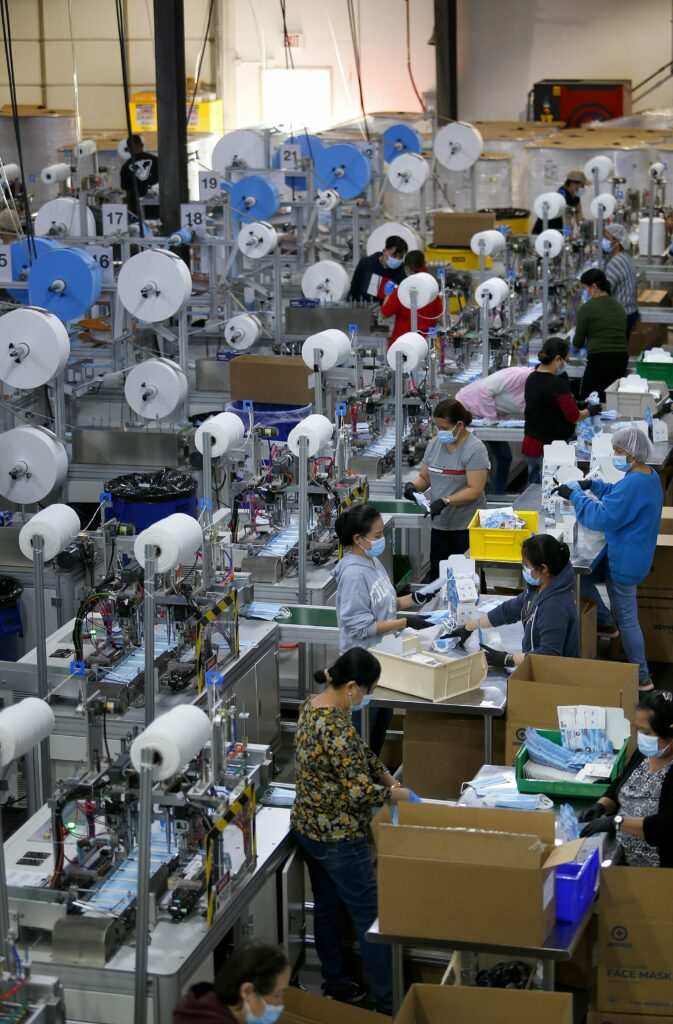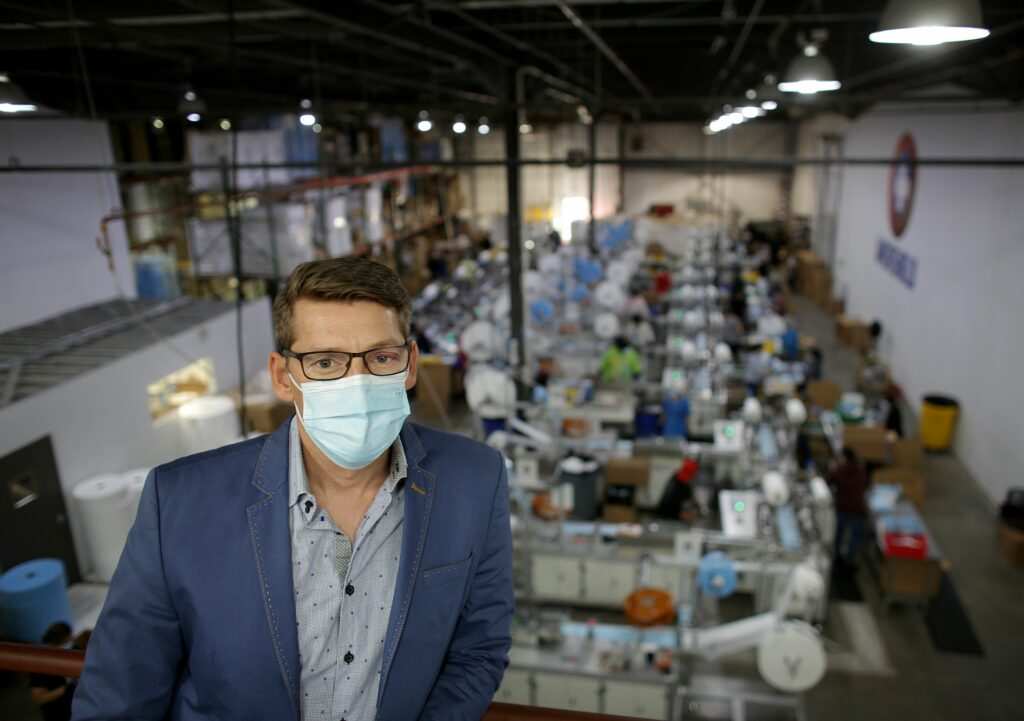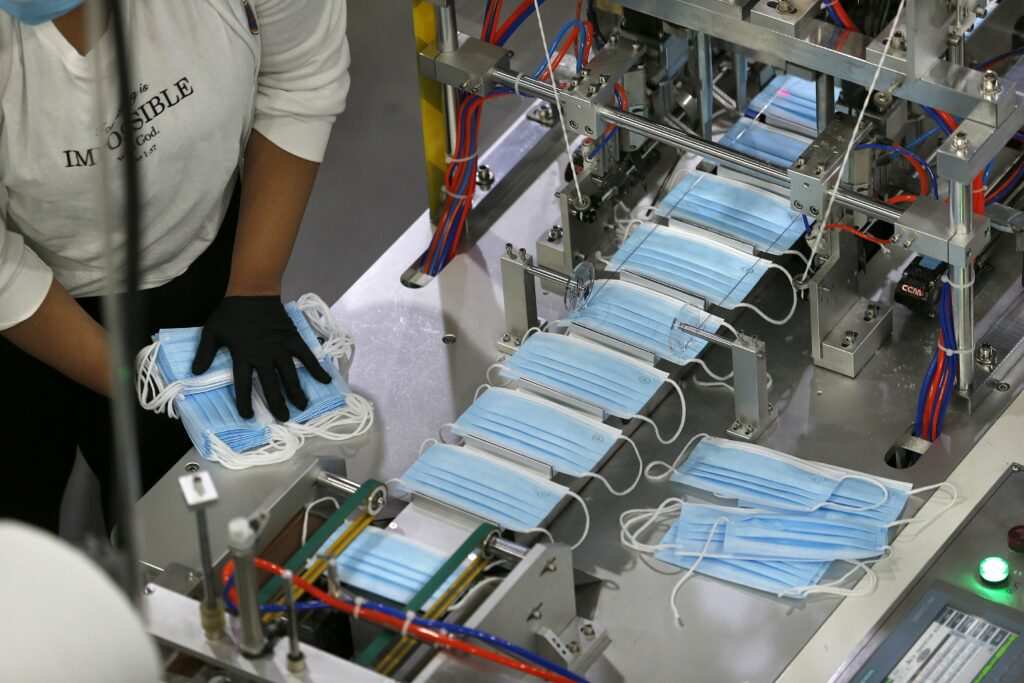Source: American Military News
A masked Dr. Fauci bobblehead sat on the conference room table inside the Virginia Beach headquarters of Premium-PPE recently, crowded by boxes of masks, remnants of a meeting with Rep. Elaine Luria to talk about the company’s challenges nearly a year into making surgical masks.
For example, Premium-PPE CEO Vitali Servutas is seeing more and more Chinese-made masks on shelves where U.S.-made ones could be.
Printed in big, bold letters on the sides of its newest boxes is the company’s plea — to the government, to health care industries, to consumers: “Pick American.”
“We’re all getting that feeling that we’re getting squeezed out by China,” said Servutas, whose company has made more than 100 million disposable surgical masks under the AmeriShield brand name since the coronavirus pandemic’s start. The “we” he was referring to includes about 15 other new-to-mask-making companies, all competitors, who started making medical masks amid a frenzied demand for hard-to-find personal protective equipment when the pandemic started.
Servutas and his fellow mask-makers have been looking into forming the American Mask Manufacturers Association and pushing for an expansion of the Berry Amendment. It requires the Defense Department to prioritize buying U.S.-made raw materials, but the mask makers would like it to also ensure that a percentage of masks bought by government agencies be made in the United States, he said. They believe a good starting point would be 20%, and hope state governments and health care industries would follow suit.
If China’s presence in the market is diminished, he said, there would be a big enough pie of business in the U.S. for all of them.

On Wednesday, President Joe Biden signed an executive order making it a priority to study and secure the country’s supply chains for critical products and industries, although masks aren’t among the initial products. Even as the pandemic persists, some factories are finding themselves with too many masks and not enough customers as the primary recipients, mainly hospitals, stockpile what they have and continue to ration.
Servutas said his business and others have the capability to ramp up production even more, they just need some assurance that there’s someone interested in buying them even if they’re a bit more expensive than the ones coming from China. He and others think it’s a matter of national security, too.
In less than year, Servutas and his business partners shifted from making and selling vaping devices and accessories in a Virginia Beach industrial park to hearing the hum of 23 machines unspool, cut and fold material into 1.1 million disposable surgical masks a day. Of the more than 100 million masks they’ve made so far, 70 million were delivered to the U.S. government to be passed on to the Federal Emergency Management Agency. Most of the company’s customers are what one might expect: hospitals, health facilities, retailers.

But there’s one that might come as a surprise — a large corporation that’s a neighbor of Premium-PPE. Stihl, the outdoor power tool manufacturer whose U.S. headquarters in Virginia Beach is within walking distance, was one of Premium-PPE’s first customers. Stihl had trouble getting masks for its employees early on — until they discovered their neighbor was making them.
“Supporting a company in our backyard, also producing American-made products, brings us a great deal of pride,” said Mike Weber, STIHL’s safety and environmental manager, calling Premium-PPE’s masks, “high quality” and “cost-competitive.”
Servutas brings in material and paper from North Carolina and Richmond, and gets filter material — which was hardest to come by in the first few months — from an even-closer supplier: Chesapeake-based Never Again Industries.
Neil McLean, co-founder and president of Never Again, said he could hardly believe it when he heard there was a mask-maker just one city over. Now his company supplies up to five tons of meltblown filter material a month to Premium-PPE, accounting for the vast majority of the seven tons a month the company produces from a space it shares at Precon Marine in Chesapeake. It’s enough to make 7 million surgical masks.

McLean and co-founder/CEO Michael Heslop started Never Again last year to import desperately needed N95 masks. When those were too hard to come by, they thought they would make the masks themselves, and ultimately discovered that needed meltblown filtering material also was very hard to acquire. They focused on making the material instead.
While the U.S. readily manufactures meltblown for things like sound absorbency in cars and walls, it had long ceded the making of fine-fiber meltblown — the breathable material for masks and respirators — to overseas producers, Heslop said.
The pair, both former military, were told it would take 18 months to get a machine, so they found components instead to assemble. After enlisting a retired, 30-year expert in regular meltblown manufacturing, and reading hundreds of thousands of pages on the process, they said they refined their process until they got the desired fine-fiber result. The company found its financial footing when a New Jersey company making N95 respirators became its first customer last summer.
The Never Again name came from both men’s deep frustration that the U.S. was so dependent on China to supply it with PPE and materials needed to make more, as the pandemic took hold.
“I could care less if toys and couches are made in China,” McNeil said. Being reliant on imported medical products, though, poses a threat to national security, he said.
Heslop had experience in supply chains, having worked in making and sourcing automotive parts and helping to find and deliver generators to Puerto Rico after deadly Hurricane Maria hit. That’s when he realized how challenging the medical supply chain can be.
“That’s what gave me the perspective on this,” he said, knowing there would be shortages in raw materials too. “Our bottom line, truly, is ensuring the supply chain continuity for the United States.”
Not wanting to rely on any non-U.S. supplies, they get their raw material — petroleum — from Texas, where it’s made into polymer before getting to Never Again.
Early last February, Servutas had seen demand for vaping devices drop off and he was looking to stock up on masks for his own company. He and his businesses partners started getting an inkling of an idea: They should make their own.
“It’s a gamble, right?” he said. “We didn’t know anything about masks.”
By the end of March 2020, he had secured a machine — one they now call “the dinosaur” — air-lifted from an overseas manufacturer that arrived without a manual, he said. The worked 18-hour and 20-hour days in the early months as he and his business partners chatted with the machine supplier over WeChat, translating instructions for fixes and improvements. Over the next few months, more than 20 machines were shipped, with each iteration of the machine getting a bit faster and more efficient.
Time has been of the essence to ramp up production. Each of the company’s 23 machines were flown in from China rather than shipped by sea. The only raw material he imports from Asia is the tiny wire that fits around the bridge of a person’s nose, which he’s had trouble finding in the U.S.
After the masks are made in the machine, complete with the inserted nose bridge wire and elastic ear loops, they come out in stacks of 10. A worker picks them up to tug at the ear loops to ensure they’ll stay put, then another workers puts them in a box that will fit 50.
From the seven people Premium-PPE had on staff before its pivot, the company has grown to more 250 people on three shifts working five days a week, sometimes more if necessary. Right now, Servutas said they have the employees they need. If there’s demand for the machines to produce up to 1.5 million masks a day, or even up to 2 million, they may need to hire more.
Lately the company has been focused on attaining a 510(k) certification that will allow Premium-PPE to sell directly to hospitals, even after the pandemic subsides and an emergency order is lifted. By mid-March, a version of all-black AmeriShield masks are expected to be carried on store shelves for the first-time at Party City locations nationwide.
Servutas expects that even as vaccines loosen the pandemic’s grip, people are likely to still wear masks to be careful around each other in the future. And if there’s another pandemic, supplies would be at the ready domestically, he said. He hopes his company’s masks will still be worn by patients, nurses and medical staff in places where an N95 wouldn’t be necessary, pandemic or not.
“Expect the best, prepare for the worst,” he said. “We’re going to look at the mask in a different view.”
___
(c) 2021 The Virginian-Pilot
Distributed by Tribune Content Agency, LLC.

